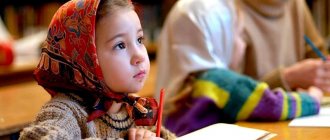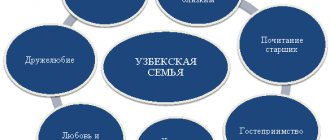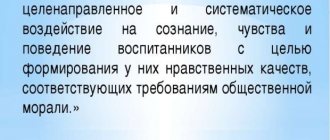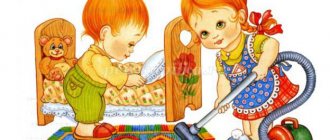What it is
How to choose the right position of moral education?
To do this, adults must know the definition of the concepts of morality, morality, and education .
Education refers to the assimilation of certain skills of social behavior instilled in the surrounding social environment, parents, and teachers.
A person uses these skills in social life. For example, he learns the rules of behavior at school, on vacation, etc.
Morality is the moral qualities of an individual , which set the boundaries of behavior, his spiritual qualities necessary for adaptation to the social environment.
That is, moral principles are the boundary that a person will never cross. Without these principles, humanity becomes like animals, guided only by instincts.
An individual may be well-mannered, know all the rules of etiquette, but his actions will be immoral, immoral.
Consultation for parents “Moral education of a preschooler in the family and kindergarten”
Brief description of the document:
Consultation for parents “Moral education of a preschooler
in the family and kindergarten"
The content of moral education is the formation of such moral qualities of a preschooler as: respect for elders, friendly relations with peers, the ability to respond appropriately to the grief and joy of other people, to achieve the effective manifestation of humane feelings and relationships, their social orientation, and the education of principles of responsibility. Among them, two areas can be distinguished: creating conditions for practical experience and forming correct moral assessments. As a result of such moral education, the child
begins to act not because he wants to earn the approval of an adult, but because he considers it necessary to comply with the very norm of behavior, as an important rule in relations between people. The formation of a child’s personality occurs initially in the family. After all, a family is a small team based on the principles of cooperation and mutual assistance, where children learn the art of living among people, loving them, feeling and showing attention and kindness to others. An important role in raising children is played by the general way of life of the family: equality of spouses, organization of family life, correct relationships between family members, a general tone of goodwill, mutual respect and care, an atmosphere of patriotism, hard work, general order and family traditions, unity of adults’ demands for the child. Family life should be organized in such a way that not only material needs, but also spiritual needs are more fully satisfied and developed.
The moral education of children occurs throughout their lives, and the environment in which he develops and grows plays a decisive role in the development of a child’s morality. Therefore, it is impossible to overestimate the importance of the family in the moral education of preschool children. The ways of behavior adopted in the family are very quickly acquired by the child and are perceived by him, as a rule, as an generally accepted norm.
There are several types of families and models of family relationships. There are dysfunctional families, single-parent families. Often in these families unfavorable conditions have been created for the development of the child and his moral qualities, and therefore most of the functions of raising and educating children in this family are taken over by a preschool educational institution. The kindergarten, having replaced the family, or rather, instead of the family, began to solve the problems of socialization of the individual. At the present time, even complete, harmonious, organized families, prosperous, with material income, cannot always devote proper time to their child. To cultivate moral qualities in a child, it is necessary to work closely and cooperate with the family. Cooperation between an educational institution and a family is one of the most important tasks of a child’s socialization in society. It is necessary to create such conditions so that the child, based on examples from experience, develops an awareness and understanding of what is good and what is bad, so that he can independently form and have ideas about moral qualities, such as greed, friendship and many others. This attitude towards the fundamental concepts of our lives continues to develop as we grow older. The child’s main assistant on this path is an adult, who, through concrete examples of his behavior, instills in the child the basic moral standards of behavior. If examples from the experience of a child and his close circle are negative, then one cannot expect him to develop high moral qualities. The primary task of parents is to help the preschooler decide on the objects of his feelings and make them socially valuable. Feelings allow a person to experience satisfaction after doing the right thing or make us feel remorse if moral standards have been violated. The basis for such feelings is laid in childhood, and the task of parents is to help their child with this. Discuss moral issues with him. Strive for the formation of a clear value system so that the child understands which actions are unacceptable and which are desirable and approved by society. Effective moral education is impossible without discussing with the child the moral side of the actions of other people, characters in works of art, and expressing your approval of his moral actions in the most understandable way for the child.
One of the important tasks of a kindergarten in social and moral education is to establish a close connection with the family. Family and preschool are two important institutions for the socialization of a child. And although their educational functions are different, their interaction is necessary for the comprehensive development of the child (Appendix No. 1 “Algorithm for interaction with the family”). The need to involve the family in the process of familiarizing preschoolers with the social environment is explained by the special pedagogical capabilities that the family has and which cannot be replaced by a preschool institution: love and affection for children, the emotional and moral intensity of relationships, their social rather than egoistic orientation. All this creates favorable conditions for the development of higher moral feelings.
In its work with families, a kindergarten should rely on parents not only as assistants to the child care institution, but as equal participants in the formation of a child’s personality. That is why the close relationship between the teaching staff, children and parents is so important. It is from teamwork, from the unity of opinions on the main issues of raising children that depends on how a child will grow up. Only under this condition is it possible to develop an integral personality.
Since, as the child develops, he tries on various social roles, each of which will allow him to prepare to fulfill various social responsibilities - a student, team captain, friend, son or daughter. Each of these roles is of great importance in the formation of social intelligence and involves the development of one’s own moral qualities: justice, responsiveness, kindness, tenderness, care for loved ones. And the more diverse the child’s repertoire of roles, the more moral principles he will become familiar with and the richer his personality will be.
Joint forms of work between kindergartens and parents on the formation of moral qualities
Working with families is an important and complex aspect of the work of a teacher and other preschool workers. It is aimed at solving the following problems:
- establishing unity in raising children;
- pedagogical education of parents;
- study and dissemination of best practices in family education;
- familiarizing parents with the life and work of a preschool institution.
- conversations;
Unity in raising children ensures the development of correct behavior in children, accelerates the process of mastering skills, knowledge and abilities, and contributes to the growth of the authority of adults - parents and educators in the eyes of the child. The basis of such unity is the pedagogical knowledge of parents, their awareness of the work of preschool institutions.
The family is the institution of primary socialization. Kindergarten is part of the system of indirect, or formal, environment of the child and is an institution of secondary socialization. All stages of the socialization process are closely interconnected.
Currently, no one doubts the need for public preschool education. The relationship of a preschool institution with a family should be based on cooperation and interaction, subject to the openness of the kindergarten inward (involvement of parents in the educational process of the kindergarten) and outward (cooperation of the preschool educational institution with social institutions located on its territory: general education, music, sports schools, libraries).
Involve parents in activities that promote joint activities between parents and children. It is necessary to widely use both group and individual forms of work with parents:
consultations: “Nurturing independence and responsibility”, “How to organize children’s work at home”;
- joint competitions: “Gifts of Autumn”, “My Herbarium”, crafts made from natural materials, crafts from vegetables, seasonal exhibitions of joint works “New Year’s toys”;
- joint work of children and parents on the topics: “My family”, “Sports family”, “How I spent the summer”. A photo album is prepared, which the children then constantly refer to and show each other photographs of their family. Children share their impressions, learn to listen to each other, and show interest in their interlocutor. This can be reinforced in the form of family project activities on the topic “Me and my whole family.” This parent-child project is long-term and includes: “My Genealogy”, “My Family Tree”, “Family Coat of Arms”, “Family Motto”, family customs and traditions. The main goal is to cultivate love for one’s relatives and family;
- leisure activities, holidays: “Mother’s Day”, “Dad, Mom, I – a friendly family”, “Fun Starts”;
- instructions for parents.
General consultations, group and general parent meetings, conferences, exhibitions, lectures, clubs are organized for the group of parents; Information and thematic stands and photo montages are designed; question and answer evenings and round table meetings are held.
In older groups, it is possible to organize a variety of joint activities between teachers, children and parents. In folklore festivals and entertainment, where parents also participate with pleasure. Thanks to such holidays and entertainment, both children and parents become familiar with the origins of folk art, the history of their people, and their traditions. It is possible to create mini museums, for example, “Russian Izba”, “Museum of Dolls”, where children can get acquainted with national costumes, antique furniture, dishes, tools, thereby becoming familiar with the origins of folk culture.
At the end of the year, the most active parents will be presented with certificates and letters of gratitude from the administration of the preschool institution at parent meetings.
Also to promote knowledge about social and moral education through a system of visual propaganda:
Information and orientation:
through information stands, parents are familiarized with the preschool institution itself, the features of its work, and with teachers involved in raising children.
Information and educational:
aimed at enriching parents’ knowledge about the characteristics of the development and upbringing of preschool children.
In groups, set up “Parent Corners” and post advisory materials.
“Algorithm for interaction with family”
- *Search for contacts at the first meeting.
The teacher must show high pedagogical tact, sincere respect for parents, delicacy, restraint, it is important not to push away with an ill-considered question. - *Discusses what is necessary to develop and educate a child
, to emphasize his individuality and uniqueness. At this stage, you can already carefully talk about unwanted manifestations in the child’s behavior. - *Establishment of general requirements for raising a child.
The teacher encourages parents to express their views on raising the child, listens to the parents’ opinion about the methods they use, even if it is wrong. Do not refute, but offer your own methods of influence, calls for joining forces to develop common demands. - *Strengthening cooperation in achieving a common goal.
Having agreed to joint cooperation, the parties clarify each other’s educational capabilities and set common goals and objectives. Disputes and disagreements are possible. It is important not to interfere with further cooperation. - *Implementation of an individual approach.
The teacher does not demonstrate his omnipotence, but confidentially communicates his doubts and difficulties, asks for advice from parents and listens to them. At this stage, a number of agreed measures are developed, including the re-education of the child. - *Improving pedagogical cooperation.
Ready-made recipes are not offered; the process of joint activities is carefully analyzed. This is the stage of development of pedagogical cooperation, where common pedagogical influences are being implemented. The initiator of contact is the teacher.







